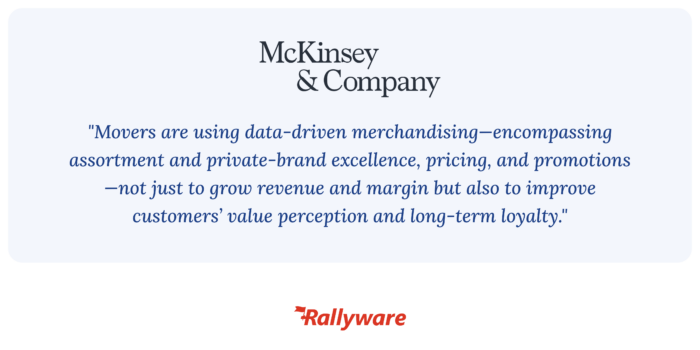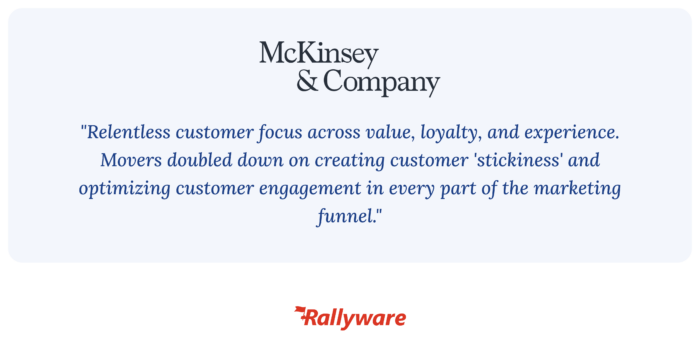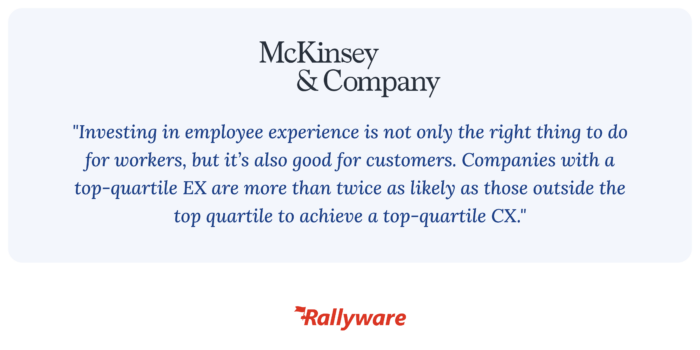Rallyware Analytics Suite for Smart Human Capital Management
McKinsey Insights: The New Rules of Frontline Sales Enablement
Why Frontline Sales Enablement Is the Key to Retail Success in 2025
As we approach 2025, retail executives are grappling with complex challenges in engaging frontline teams effectively to deliver meaningful customer experiences. The recent McKinsey reports “How retailers can build and retain a strong frontline workforce” and “Retail’s outperformers: Lessons in value creation” underscore the critical importance of frontline sales enablement, showing that retailers who invest in this area achieve up to 30% higher customer retention rates. In today’s competitive landscape, where customer loyalty is increasingly fleeting, retailers need to rethink how they empower associates through robust retail sales enablement strategies to deliver personalized, high-impact interactions.
So, what are the essential strategies for modern frontline enablement? Below, we outline seven critical rules drawn from McKinsey’s insights that are transforming how retailers engage their frontline teams, optimize promotions, and ultimately build lasting customer loyalty in 2025 and beyond.
Rule #1: Drive Strategic Promotions with Precision-Driven SKU Focus
Retailers are under increasing pressure to ensure promotions are highly relevant and timely. According to McKinsey’s findings, data-driven merchandising that aligns assortment, pricing, and promotions not only boosts revenue and margin but also strengthens “customers’ value perception and long-term loyalty.” SKU-driven promotions are essential for adapting to market dynamics, ensuring that high-demand products receive prioritized attention in customer interactions.

When frontline associates receive real-time updates on stock and SKU performance, they can maximize promotional effectiveness by focusing on items that resonate with customer demand. This approach can lead to a 20-25% increase in promotion effectiveness according to the McKinsey findings. With enhanced SKU strategies, associates are better equipped to provide immediate value, contributing to an overall increase in customer satisfaction and engagement.
Rule #2: Empower Cross-Category Expertise for Seamless Upselling
Frontline associates who understand multiple product categories are positioned to boost sales through well-informed recommendations. McKinsey’s findings highlight how investing in cross-category training for associates can have a measurable impact on transaction values, satisfaction rates, and long-term loyalty. This cross-category knowledge enables sales force enablement by helping associates deliver a seamless shopping experience, guiding customers to complementary products and thereby enhancing the value of each transaction.
Rule #3: Transform Associates into Customer Champions Who Build Loyalty
Today’s empowered consumers expect more than transactions; they seek experiences that align with their unique needs. McKinsey emphasizes the need for “relentless customer focus across value, loyalty, and experience,” with the best performers “doubling down on creating customer ‘stickiness’ and optimizing customer engagement in every part of the marketing funnel.” Empowering associates as “customer champions” can drive significant loyalty.

Retail sales enablement must therefore prioritize soft-skills training, enabling associates to personalize interactions genuinely. By fostering a customer-centric approach, retailers cultivate long-term loyalty and ensure every customer interaction builds a positive connection.
Rule #4: Enhance Regional Relevance with Targeted Communication
Retail is inherently local, and consumer preferences vary widely across regions. McKinsey’s research supports the notion that retailers must tailor their strategies to the unique demands of each locale. For example, regionalized promotions and inventory insights enable associates to better address local customer expectations, often resulting in up to a 28% uplift in customer engagement.
By empowering associates with location-specific insights, retailers can improve relevancy in their interactions, creating a seamless experience that aligns with both regional demands and retail values.
Rule #5: Build a Strong Community for Higher Engagement and Retention
Retailers face an ongoing challenge with turnover among frontline associates. According to McKinsey, losing a single frontline retail employee costs a retailer nearly $10,000 on average when considering training and productivity losses. To combat this, fostering a sense of community can be an effective retention strategy. “Investing in employee experience is not only the right thing to do for workers, but it’s also good for customers,” McKinsey reports, noting that companies with strong employee experience (EX) are twice as likely to achieve top-tier customer satisfaction (CX).

By creating an environment where associates feel valued and connected, retailers benefit from reduced turnover and increased morale, leading to a more stable and motivated workforce.
Rule #6: Recognize High-Impact Associates to Set a Standard of Excellence
Recognition is a powerful motivator, and as McKinsey notes, “high-performing and engaged frontline managers have a downstream positive impact on the broader frontline organization.” Acknowledging top performers not only enhances team morale but also sets a standard for others to emulate. This ripple effect fosters a culture of excellence and drives associates to deliver exceptional customer service.
With performance metrics such as customer feedback and sales contributions, retail leaders can transparently recognize achievements, building an environment where excellence is encouraged and sustained.
Rule #7: Streamline Retail-Brand Collaboration on Training and Engagement Content
In multi-brand environments, streamlined collaboration is essential. McKinsey’s report discusses how “movers” in the industry have successfully scaled their operations by investing not only in tools but also in “the product management capabilities to scale the use of those tools.” Streamlining training content across brands ensures that associates can confidently represent multiple brands, enhancing customer experiences and fostering a cohesive retail ecosystem.
Aligning sales enablement initiatives with brand values creates a unified message that associates can easily deliver, thereby strengthening brand-consumer connections and contributing to a more holistic shopping experience.
Embracing the Future of Frontline Sales Enablement
McKinsey’s extensive research on the retail sector makes one thing clear: frontline sales enablement is crucial for achieving a sustainable competitive edge. As the report notes, the path to retail success in 2025 depends on empowered, knowledgeable teams that can deliver a seamless customer experience. By implementing these rules for frontline enablement, retail leaders can drive engagement, foster loyalty, and enhance their associates’ effectiveness.
Want to experience Rallyware for Retail? Schedule a demo today to discover how our solutions have led the way in frontline sales enablement, enhancing customer service excellence and meeting the evolving needs of retail.
News and Insights on Workforce Training & Engagement
We’re among top-notch eLearning and business engagement platforms recognized for effective training and talent development, helping to empower distributed workforces
Subscribe
